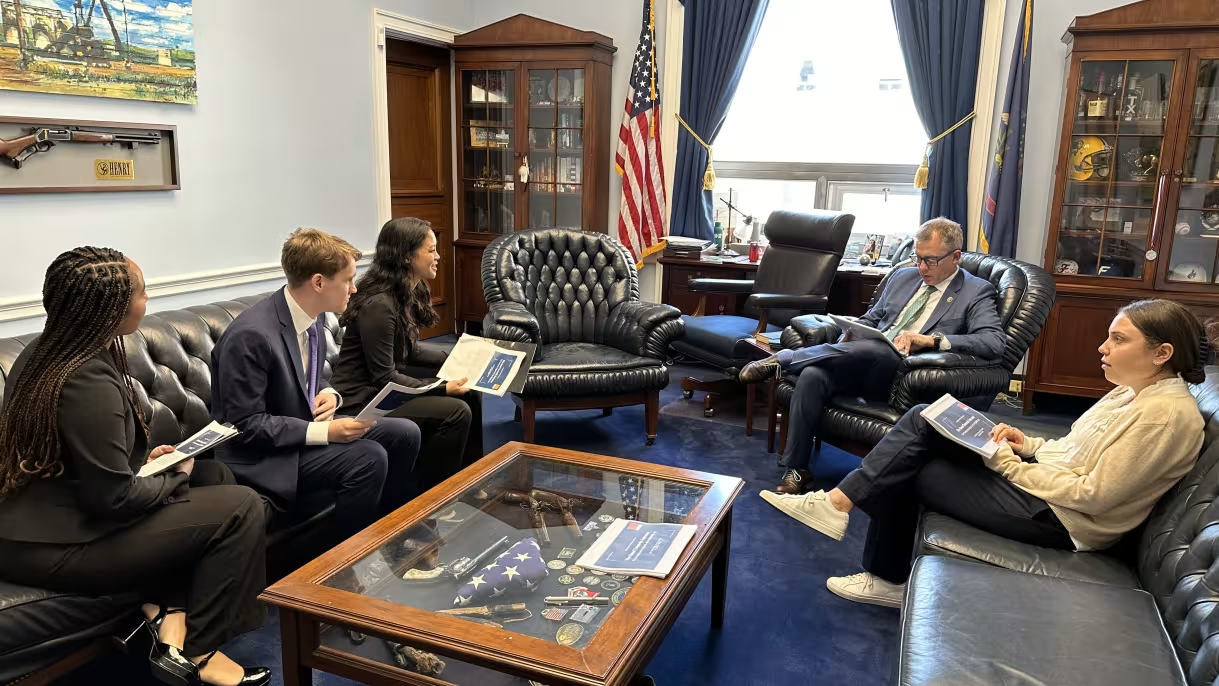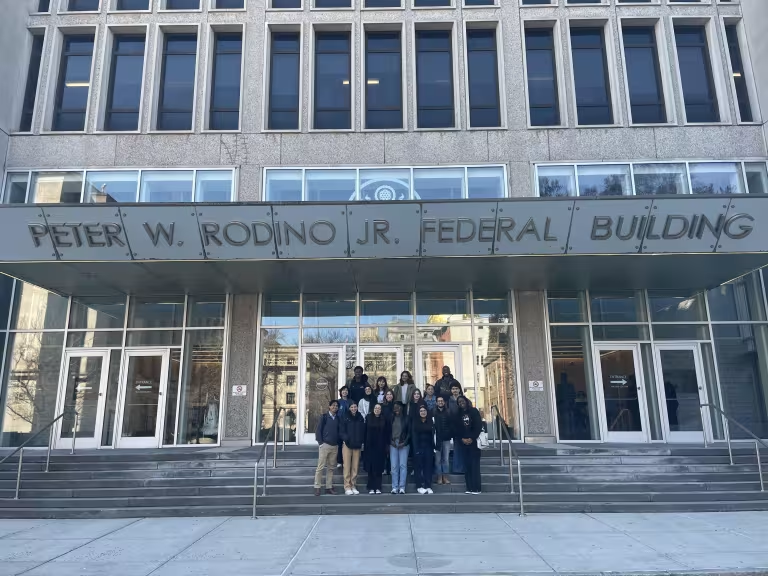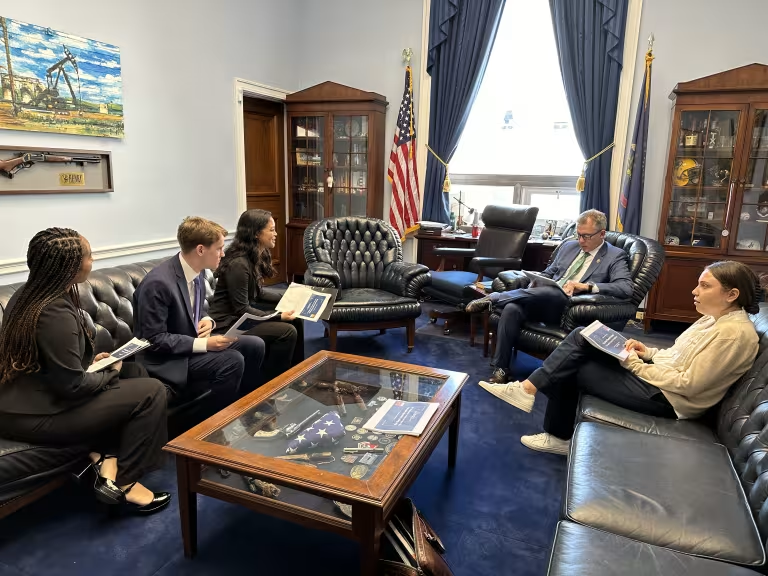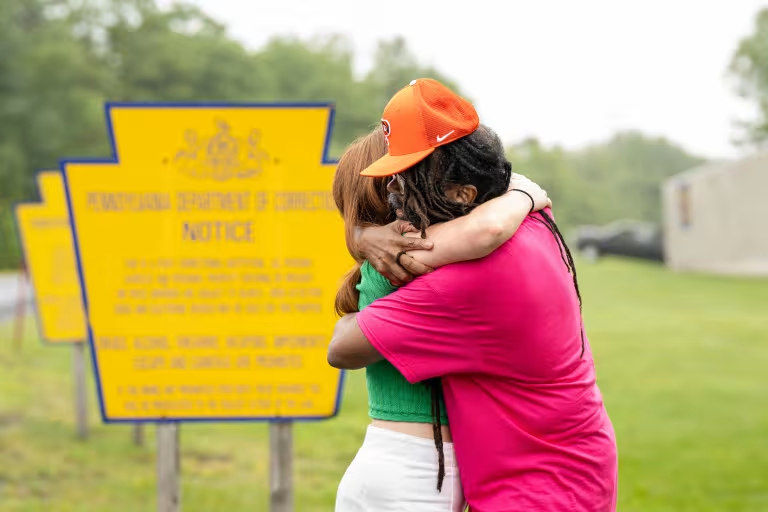

For Princeton SPIA Undergrads, ‘Direct Links Between Theory and Practice’
A collection of new and existing courses is giving undergraduate students in the Princeton School of Public and International Affairs the chance to apply what they are learning in real time.
“Our experiential learning courses push students to come up with innovative approaches to real-world challenges and to recognize the impact public policy can have,” says Paul Lipton, senior associate dean for academic administration. “By working directly with individuals in our local and global community, students see direct links between theory and practice, highlighting the value of a broad multidisciplinary liberal arts education.”
SPI 356/ANT 353/LAS 386: Asylum: Policy, Politics, and Practice

in Newark, New Jersey.
Amelia Frank-Vitale, an assistant professor of anthropology and international affairs, is supplementing her classroom instruction – an introduction to the theory, ethics, and history of international protection – by having students help actual asylum seekers to craft their personal narratives of persecution.
Drawing on research she has conducted in Honduras, Frank-Vitale offers expert testimony on behalf of Hondurans seeking asylum in the United States. The practice has given her what she calls “a kind of backdoor training in asylum law,” which helped inform her development of the course.
“There are too few attorneys for the massive backlog of cases in immigration court, and each case needs detailed, specific research to support it,” she says. “A course like this is a great way to both teach students about the ideas behind the system of international protection – as well as the history of its evolution and the critiques of it – while also putting the energy and skills of undergrads towards the real work of putting together an asylum claim.”
An asylum seeker’s personal narrative – a detailed account of the reasons they are seeking protection in another country – plays a significant role in the strength of their case. Frank-Vitale has partnered with Project Rousseau, a New York-based provider of comprehensive immigration services, to give students the opportunity to do hands-on work with six people seeking asylum in the United States.
“I hope students will find the course both challenging and inspiring,” Frank-Vitale says, “and that they'll walk away with deep knowledge about international and U.S. law regarding asylum protections and a clear idea of how research and writing skills can contribute to community-engaged work.”
SPI 413: The Criminal Legal System: Advocacy and Freedom

former Ohio Supreme Court Justice Yvette McGee Brown.
Instructor Maya Dimant, a lecturer and professional specialist in Princeton SPIA’s Program in Law and Public Policy, aims to teach students about the criminal legal system in general and about New Jersey’s system in particular. The course’s focus is on post-conviction advocacy, with students working in teams to explore different remedies, including clemency and commuted sentences, for incarcerated people. At the end of the semester, students will present their cases to community stakeholders such as the Conviction Review Unit of the New Jersey Attorney General’s Office, the New Jersey Office of the Public Defender, the ACLU of New Jersey, and journalists from the Marshall Project.
“The criminal system disproportionately impacts people of color, queer people, and other marginalized populations,” Dimant says. “When the state encroaches upon rights, safety, and freedom, this discrimination should be a concern for everyone. I hope students take away that they have the power and responsibility to impact both larger systems and the fate of individual people, and the skills and confidence to do so.”
Students are spending the first four weeks of the course learning criminal legal system context, while building a toolkit to conduct this work ethically and thoughtfully, including trauma-informed interviewing training. They’ll also begin building a relationship with their clemency applicant and learn investigative skills to help them build their case. In the second four weeks, they will study elements of successful advocacy while continuing to investigate their cases, and learn how to structure their advocacy petition and presentation. In the course’s final four weeks, they will write their petition and prepare their presentations while also continuing to secure outside resources to demonstrate the likelihood of their applicant to successfully integrate back into society.
“As a policy school, we are training leaders to create, craft, and influence the laws that will govern our lives,” Dimant says. “It is important to ensure that our students have meaningful touchpoints working both with people and within systems so that their perspectives are informed by evidence-based theory and experiential practice in the field.”
SPI 490 AND SPI 301: Policy Advocacy Clinic

Now in its third year, the innovative, two-semester course immerses students in the policy advocacy process. In the fall, students learn about policy advocacy theory, the policymaking process, constitutional principles, and practical skills such as how to draft a policy analysis memo, put together an advocacy campaign plan, and conduct a political feasibility test. In the spring, students put those learnings into action by working on real-life policy advocacy issues.
This year’s student teams are working on four policy advocacy projects, before the United Nations, the Louisiana State Legislature, and the New York State Attorney General. Two of the projects cover criminal justice and two technology issues. The projects focus on United States compliance with international anti-torture conventions, Southern support for bipartisan criminal justice reform, refugee assistance through technology, and protecting online privacy. Student advocacy on these projects takes them to Geneva, Switzerland; Baton Rouge, Louisiana; and New York City.
“The Policy Advocacy Clinic inspires and equips the next generation of policy thinkers and advocates,” says Udi Ofer, founding director of the Policy Advocacy Clinic and the John L. Weinberg Visiting Professor and Lecturer. “By the end of the year, students learn about the policy advocacy process, gain practical skills on how to advance public policy, and have had an opportunity to apply these skills and knowledge in actual public policy situations, all in a nonpartisan manner.”
SPI 494: Making an Exoneree

The popular course is back for a third year at Princeton SPIA, this time taught by Visiting Lecturer Chelsey Max Amelkin, a staff attorney the Appellate Advocates, and Visiting Lecturer Yosha Gunasekera, a staff attorney with the Innocence Project.
With an estimated 46,000 to 230,000 innocent Americans in prison, “preventing wrongful convictions and creating a more just criminal legal system is critically important work that college students can meaningfully further,” Gunasekera and Amelkin say.
As before, the course comprises three parts. First, the students are introduced through readings and lectures to the landscape of wrongful convictions and post-conviction law. Next, they will gain research and reinvestigation skills to engage thoughtfully and compassionately with the class’s incarcerated person, who is chosen from among a group that have been nominated, by themselves or their family or friends, to Georgetown University’s Prisons and Justice Initiative, where Making an Exoneree began. The Georgetown team assesses the nominees’ applications for indications that they may have been wrongly convicted, and Amelkin and Gunasekera determine which of them would be good matches for the student team.
Finally, students learn a series of filmmaking techniques that equip them with story-telling and social justice activism strategies to create short documentaries, as well as websites and social media campaigns, that tell stories of innocence and advocate for justice.
“The passion, zeal, and empathy our students have for the real people behind the cases they are working on is incredible,” Gunasekera and Amelkin say. “It's inspiring to see previous MAE Princeton students walk innocent people out of prison and see how they continue to advocate for the most vulnerable long after this class has ended. We hope this semester's students not only learn the beginning fundamentals of the criminal legal system but are able to use them to advocate for wrongfully convicted individuals as they fight for freedom.”

